His employer was leaning forward in his chair, gripping the arms fiercely as he stared at him.
“Do you believe it possible, Mr. Czenki,” he asked deliberately, “that Mr. Wynne has found these diamond fields?”
The expert shrugged his slender shoulders.
“It is possible, of course,” he replied. “From time to time great sums of money have been spent in searching for them, so—” He waved his hand and was silent.
“Zo you see, Laadham,” Mr. Schultze interpolated, “ve don’d know anyding much. Ve know der African fields, und der Australian fields, und der Brazilian fields, und der fields in India, bud ve don’d know if new fields haf been found. By der time you haf lived so long as me you won’t know any more as I do.”
There was silence for a long time. Mr. Czenki sat with impassive face, and his hands at rest on the arms of the chair. At last he spoke:
“If you’ll pardon me, Mr. Latham, I may suggest another possibility.”
“Vas iss?” demanded Mr. Schultze quickly.
“Did you ever hear of the French scientist, Charles Friedel?” Mr. Czenki asked, addressing Mr. Latham.
“Never, no.”
“Well, this idea has occurred to me. Some years ago he discovered two or three small diamonds in a meteor. We may safely assume, from the fact that there were diamonds in one meteor, that there may be diamonds in other meteors, therefore—”
The German importer anticipated his line of thought and arose with a guttural burst of Teutonic expletives.
“Therefore,” the expert went on steadily, “is it not possible that Mr. Wynne has stumbled upon a huge deposit of diamonds in some meteoric substance some place in this country? A meteor may have fallen anywhere, of course, and it may have been only two months ago, or it may have been two thousand years ago. It may even be buried in his cellar.”
The huge German nodded his head vigorously, with sparkling eyes.
“It seems extremely probable that if diamond fields had been discovered in the Appalachian Range,” Mr. Czenki went on, “it would have become public in spite of every effort to prevent it; whereas, it is possible that a meteor containing diamonds might have been hidden away easily; and, also, the production of diamonds from such a source in this country would not make it necessary for the diamonds to pass through the Custom House. Is it clear, sir?”
“Why, it’s absurd, fantastic, chimerical!” Mr. Latham burst out irritably. “It’s ridiculous to consider such a thing.”
“I beg your pardon,” Mr. Czenki apologized. “It is only a conjecture, of course. I may add that I don’t believe that three stones of the size of the replicas which Mr. Wynne produced here could have been found anywhere in the world and brought in here— smuggled in or in the usual way—and the secret held against the thousands of men who daily watch the diamond fields and market. It would not be difficult, however, if one man alone knew the source of the stones, to keep it from the world at large. I beg your pardon,” he added.




